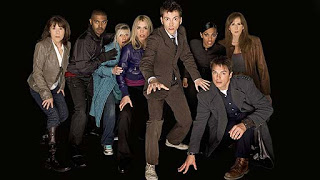That was the question posed in the Books section of Outpost Gallifrey recently. You might not be surprised to read that my short answer is “No”, but hopefully my further observations might be of some interest…
First of all, I really enjoy all three writers and their books. Secondly, in the interests of full disclosure, I’m a Christian and so have more sympathy with C S Lewis’ religious views than Pullman’s views. Although I disagree with Pullman’s views on religion, I don’t object in principle to him putting them in his books, but I think that The Amber Spyglass is horribly one-sided and swamps the narrative, and is far more preachy than anything in Narnia.
J K Rowling, of course, has very strongly Christian themes running through the Harry Potter series. Having spotted these themes in the first six books, I worked out pretty much exactly how the final confrontation between Harry and Voldemort would play out before reading The Deathly Hallows, except for the part that the Hallows themselves played. I find it slightly odd how the themes in Harry Potter are so Christian, and how it constantly hints at Christianity (such as the fact that Harry was christened, his parents’ gravestone and so on), but seems to completely exclude any explicit mentions of religion at all. It’s an allegory that on the surface is almost entirely secular; Hogwarts is haunted by the absence of God. But I’d argue that with the Harry Potter books, J K Rowling is the best allegory writer of the three authors.
Are they overrated? I think that C S Lewis is underrated in the current climate because Christianity is out of fashion, but as a Christian, I would think that, wouldn’t I? Lewis taps into a rich vein of story and myth that includes Christianity (“the myth that became fact”, as he saw it), but also includes a rich range of folklore and classical mythology. All of it works as simply good story (with the possible exception of The Last Battle, which is actually more Neo-Platonist than genuinely Christian). That Lewis was aware that the Lion of Judah is a symbol for Christ in the Bible shouldn’t stop you enjoying Aslan as being a really cool magic talking lion.
I don’t think that J K Rowling is overrated except in comparison to other writers. The Harry Potter books are great adventure stories, and thoroughly deserve to be enjoyed as widely as they are. The problem is that other writers’ books are just as deserving, or even more deserving of such attention. If only all good stories received the attention that Harry Potter received! The problem is not that J K Rowling is over-hyped, it’s that virtually every other writer is under-hyped.
I think that books 1-3 are the best because they’re concise and to the point. From The Goblet of Fire on, and particularly in The Order of the Phoenix, Rowling is in need of a strict editor with a red pen at the ready. She’s a victim of her own success, in some ways. If she’d had to write the entire series under the normal constrictions that writers usually work under, they’d probably have been quite a lot better. She also doesn’t have any particular flair for language as such. She’s a very good storyteller, but not so good a writer.
I suspect Pullman might prove to be the most transient of the three. I don’t think he finds a big enough story in place of the religious story he rejects. He rejects the Christian story not so much by tearing it down as completely ignoring it. The story of Christianity, of God coming as a man, living a perfect life, and dying and rising to establish his perfect Kingdom that is both now and not-yet, never gets a look-in, probably because Pullman is smart enough to know that he’d never win in a fair fight. The fight against the twisted god of the Authority is fundamentally reactive, and the Republic of Heaven, as Pullman portrays it, doesn’t have the weight of Myth necessary for it to be a truly lasting story. Much the same as secular humanism as a philosophy, actually – it’s defined more by what it rejects, and hasn’t yet come up with anything to satisfy the human imagination in quite the same way as the stories of faith.
I think that the stream of literature that Lewis, Pullman and Rowling represent is very strong and enjoyable I’m working on a novel of my own, and it’s very much intended to stand in the tradition of these writers. In some ways its a reaction and a reshaping of the ideas and themes of these three writers, though hopefully it has many new and original things to say as well. Watch this space!


 Last month
Last month 


